January 5: When a pope buries a pope emeritus
The image will go down in history: a pope celebrating the funeral of his predecessor. Benedict XVI, who died on December 31, 2022, passed away after 10 years of retired life in a Vatican monastery. In bitterly cold conditions, the coffin of the first pontiff emeritus since the 13th century was laid out before some 50,000 people gathered in St. Peter's Square for the funeral.
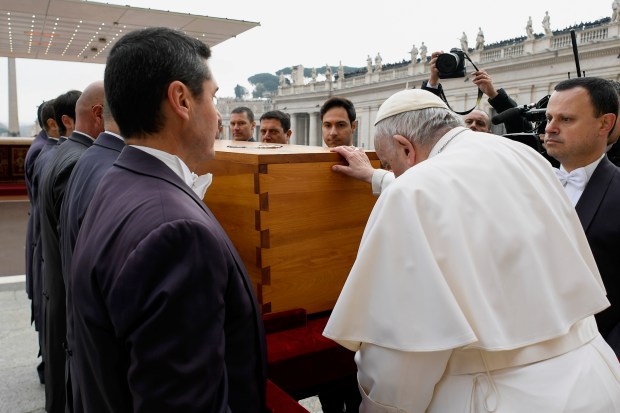
"Benedict, faithful friend of the Bridegroom, may your joy be complete as you hear his voice, now and forever," wished Pope Francis in his homily. Marked by great sobriety, the mass concluded with the unusual gesture of Pope Francis placing his hand on the cypress coffin of his predecessor in a moving sign of farewell.
January 31-February 5: a trip to Africa for peace
Traveling to Africa from January 31 to February 5, the Pope came to the aid of two countries marked by violence. In the Democratic Republic of the Congo, he met victims in the east of the country and denounced the ethnic and economic mechanisms that have plunged the region into the abyss.
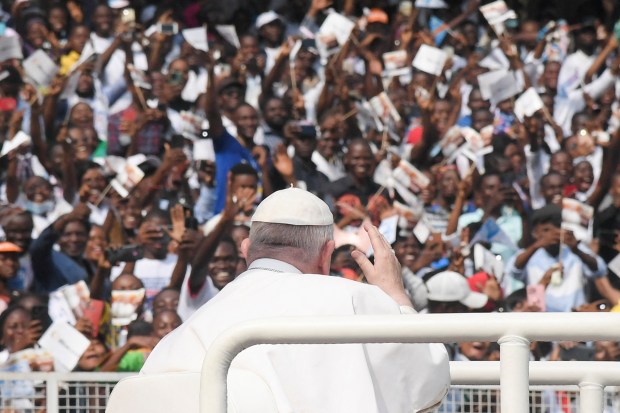
Calling on the West to take its “hands off Africa,” the head of the Catholic Church also denounced corruption in a packed Kinshasa stadium with an electric atmosphere.
In South Sudan, the Pope met the country's two leaders. Their country continues to be torn apart by ethnic strife and financial interests. Four years earlier, the pontiff had knelt before them in a shocking plea for peace.
March 9-11: the German Synodal Way calls for change
The final session of the German Synodal Way was held in Frankfurt from March 9 to 11. Launched in 2019 by German Church leaders afflicted by the revelation of abuse scandals and losing momentum, this process became the channel for demands within the Church on issues such as homosexuality, women's ministries, priestly celibacy and the place of lay people in decision-making processes. Pope Francis criticized the German approach and its "egocentricity," but without yet adopting any punitive measures.
March 29 and June 7: The Pope is hospitalized twice
The year 2023 was marked by two hospitalizations for Pope Francis. On March 29, the pontiff was taken to the Gemelli hospital for treatment of infectious bronchitis. After antibiotic treatment, he left the hospital on April 1 and lightened his schedule for a time. From June 7 to 16, he was hospitalized again, undergoing surgery for a possible intestinal obstruction. On June 11, for the first time in his pontificate, he postponed the recitation of the Sunday Angelus in public, in order to observe the rest prescribed by the medical profession. During his hospitalization, the Vatican chose to communicate widely on the pontiff's state of health, even letting his surgeon answer questions from journalists.
April 28-30: A trip to Hungary, at the gateway to Ukraine
At the end of April, Pope Francis visited Budapest, Hungary, for the second time in his pontificate, following his whirlwind visit in September 2021.
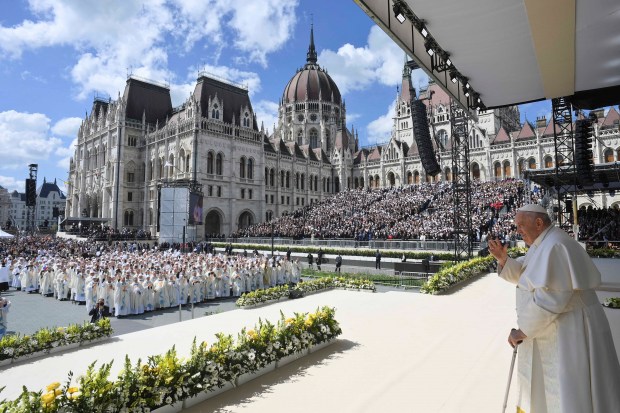
At odds with Prime Minister Viktor Orban's migration policy, the pontiff had relativized the significance of his first visit. A year and a half later, with the war in Ukraine, Vatican diplomacy finds itself in tune with Hungary's isolated path, which pleads for a diplomatic resolution to the conflict. There, on Ukraine's doorstep, the pontiff called on Europe to make "creative efforts for peace." He also praised the country's family policies, speaking out against "gender ideology" and abortion. However the pontiff also warned against "self-referential populism."
July 1: Pope appoints Archbishop Fernández Prefect for the Doctrine of the Faith
This is the most important appointment of 2023. Succeeding the Spanish Jesuit Luis Ladaria Ferrer at the head of the dicastery for the Doctrine of the Faith, the Argentinian Cardinal Víctor Manuel Fernández shares with the Pope — with whom he is close — the concern to always privilege a pastoral approach.
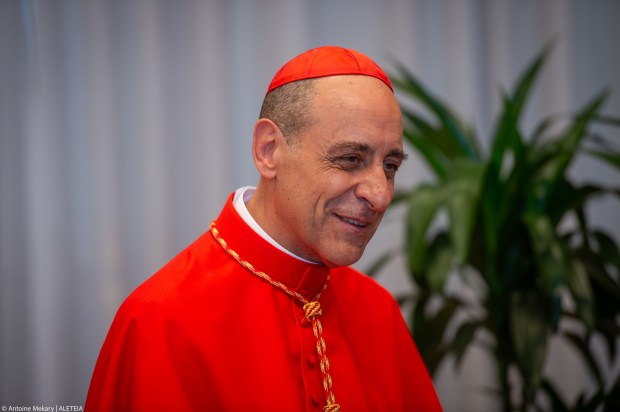
This cardinal is considered one of the authors of the apostolic exhortation Amoris laetitia.
This prelate, who became a cardinal in September, has given the dicastery a new style, responding to doctrinal questions at a pace that is unusual for the Vatican.
August 2-6: Pope Francis meets young people in Lisbon
After taking part in the World Youth Days in Rio (2013), Krakow (2016), and Panama (2019), the Pope was in Lisbon from August 2-6 to meet up with young Catholics from all over the world. With over 1.5 million participants expected to attend the final weekend, the gathering turned out to be a great popular success.
Often straying from his text, Pope Francis preferred to improvise and address young people directly, as he did at the final vigil, when he asked them to be "missionaries of joy." He also stressed that the Church must welcome everyone. The convening of a Youth Jubilee in Rome in 2025 and the next WYD in Seoul in 2027 confirmed the Pope's desire to continue the great gatherings instituted by John Paul II.
August 31-September 4: A pope in the Mongolian steppes
Visiting Mongolia's tiny Catholic community of 1,400 believers, the Pope highlighted the missionary impetus behind these embryonic Churches, which focus on the essentials of Christian life. From Ulaanbaatar, he was also able to send a message to the whole of Asia, and in particular to China — around a hundred Chinese Catholics had made the trip. He assured them of the Church's willingness to journey respectfully alongside them. It was the first time a pope had set foot on Mongolian soil.
In 2022, Francis created the first cardinal for the country, an Italian missionary who had been in the country for years and had been made a bishop in 2020.
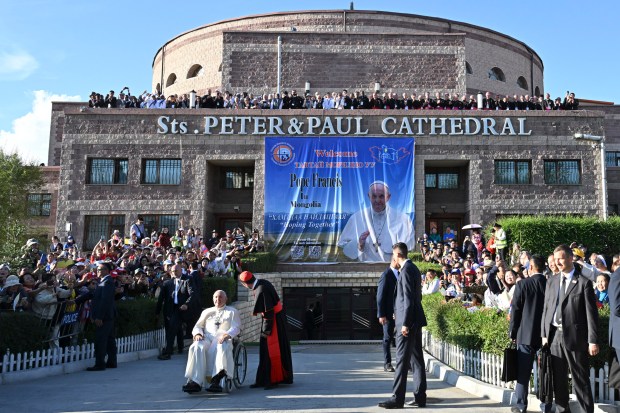
September 22-23: Francis in Marseille
For the second time in his pontificate, following a trip to Strasbourg in 2014, the Pope set foot on French soil for a two-day visit to Marseille. The pontiff came to take part in a meeting of Mediterranean bishops and young people, who were gathered to discuss the common issues of migration affecting the region.

Despite a closed-door meeting with French President Emmanuel Macron, the trip was not an official state visit. The Pope invited French Catholics to a "new leap in faith, charity and hope."
September 30: The Pope refines his College of Cardinals
Pope Francis continued the renewal of the College of Cardinals (now almost three-quarters of the current cardinals were appointed by him) by creating 21 new cardinals at the end of September.
While this ninth group includes bishops from the periphery, the consistory was marked by the entry of people close to Pope Francis and diplomats.
Europe emerged significantly strengthened, with eight European cardinals making their entry.
Strategic choices included the appointment of the Latin Patriarch of Jerusalem, Pierbattista Pizzaballa, and the Bishop of Hong Kong, Stephen Chow, as cardinals.
October 4: Pope publishes 'Laudate Deum' ahead of COP in Dubai
Eight years after his encyclical Laudato si', Pope Francis chose to publish an apostolic exhortation Laudate Deum on the feast of St. Francis of Assisi to renew his cry for an integral ecology.
The Pope denounces climate skeptics and laments the failures of recent international climate summits. He devotes an entire chapter to COP28 in Dubai, calling for "efficient, obligatory, and readily monitored" forms of energy transition to be put in place. Due to illness, the Pope had to abandon a planned trip to Dubai to deliver in person the message of Laudate Deum to the world's heads of state and government in early December. Cardinal Pietro Parolin delivered the address in his stead.
October 28: Synod on the Future of the Church votes on synthesis
For the first time since its creation, lay men and women were able to vote at a Synod of Bishops. On the evening of October 28, after a month's work behind closed doors, 344 members approved a synthesis report to serve as a guide until the final session of this "Synod on Synodality," scheduled for October 2024.
The 40-page text suggests ways of making the Catholic Church more participatory, and puts forward proposals on sensitive subjects such as the question of the female diaconate, and governance in the Church, including a reflection on the ministry of bishops. The synthesis report, which is cautiously written, also reflects tensions within the Church and divergences between North and South.
November 22: The Pope struggles with the Holy Land
Since the outbreak of war in the Holy Land on October 7, the Pope has made countless calls for a ceasefire. On November 22, he received relatives of Israeli hostages held by Hamas in Gaza, followed by relatives of Palestinians suffering from the conflict.
Following the line of Vatican diplomacy, the pontiff wanted to avoid favoring either side in the conflict. But the initiative ended up causing chagrin on both sides.
Mid-December: final hearings in the major financial trial
Pending the verdict, due in mid-December, the Vatican's major financial trial — begun in 2021 — is drawing to a close. It is a sign of the pontiff's willingness to reform the Holy See's economic ecosystem, to the point of agreeing to call a cardinal (Angelo Becciu) to testify. However, the proceedings ultimately proved to be very thorny for Vatican justice. And, whatever the outcome, it revealed a less than favorable side of the workings of the Holy See's Secretariat of State, the Vatican's central administration.
December 7: the Syro-Malabar Church on the brink of schism
"Re-establish communion, and remain in the Catholic Church!” This was the Pope's plea in a video message to the Indian Syro-Malabar Church. At the same time, the pontiff accepted the resignation of the head of this Church, Cardinal George Alencherry, who is caught up in the turmoil.
In fact, his archeparchy of Ernakulam-Angalamy has become the front line in a liturgical war since the announcement in August 2021 of the entry into force of a reform of this Eastern rite. Approved in voting by the Synod of Bishops, the reform has provoked a revolt among clergy and laity alike. On several occasions, the Pope has asked them to submit, sending letters and emissaries, to no avail. This time, he is giving them until Christmas to apply the reform and avoid becoming "a sect.”






